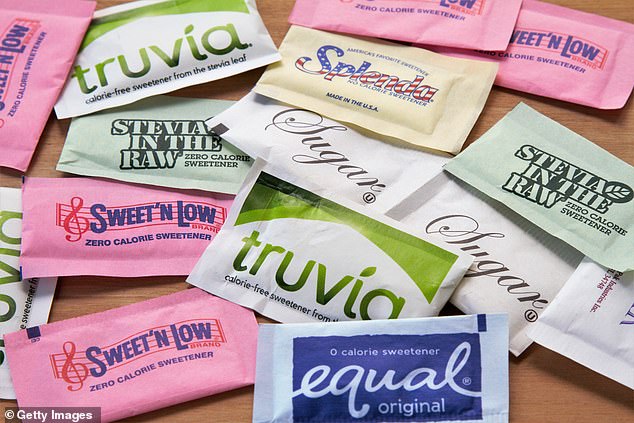A common artificial sweetener found in fizzy drinks, chewing gum and ice cream can damage the gut, research has shown,
Tests have found neotame, one of the new generation of artificial sweeteners, has the potential to trigger irritable bowel syndrome or even sepsis.
Experts said it adds to growing evidence that consuming high levels of such ingredients – typically found in ‘diet’ and ‘sugar free’ foods and drinks – may cause serious health problems.
Sweeteners are sugar substitutes that mimic the taste of sugar while having a negligible effect on energy intake.
As such, their use has skyrocketed as a ‘healthier’ and less-calorific way to consume sweet treats.
Sweeteners (pictured) are sugar substitutes that mimic the taste of sugar while having a negligible effect on energy intake
But recent studies have suggested the likes of sucralose and aspartame are not without their own risks.
Neotame is a relatively new sweetener in the global market with limited data on its effects on gut health.
But now research by Anglia Ruskin University has found it has the potential cause ‘good bacteria’ to become diseased.
Tests on cells also found it was also capable of breaking down the barrier which forms part of the gut wall, putting people at risk of serious health issues.
Ultimately, these changes could lead to metabolic and inflammatory diseases such as irritable bowel disease, sepsis or insulin resistance, often a precursor to type 2 diabetes.
Dr Havovi Chichger, senior author of the study, said: ‘There is now growing awareness of the health impacts of sweeteners such as saccharin, sucralose and aspartame, with our own previous work demonstrating the problems they can cause to the wall of the intestine and the damage to the “good bacteria” which form in our gut.
‘This can lead to a range of potential health issues including diarrhoea, intestinal inflammation, and even infections such as septicaemia if the bacteria were to enter the blood stream.
‘Therefore, it is important to also study sweeteners that have been introduced more recently.
‘And our new research demonstrates that neotame causes similar problems, including gut bacteria becoming diseased.’
Published in the journal Frontiers of Nutrition, researchers say it is vital that more studies are carried out.
Dr Chichger added: ‘Understanding the impact of these pathogenic changes occurring in the gut microbiota is vital.
‘Our findings also demonstrate the need to better understand common food additives more widely and the molecular mechanisms underlying potential negative health impacts.’
Source: Mail Online
